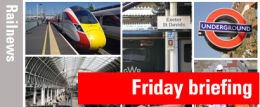Posted 22nd April 2022 | 1 Comment
Bid to reduce costs of signalling systems

The Office of Rail and Road is working with Network Rail to encourage greater competition among suppliers of signalling equipment and so reduce costs. The ORR carried out a study of the market, which is worth £800-900 million a year, and published its recommendations in November 2021. Network Rail has been working for several months on the development of a revised commercial approach for how it procures signalling systems in Control Period 7, which starts in 2024. In particular, its forthcoming ETCS contracts will be ‘materially different’, because they will lower barriers to new entrants and reduce the investment suppliers need. Network Rail has also agreed with the ORR to develop and provide additional information to improve transparency and aid future decisions about the signalling renewal market.
First tram runs on WMM extension
A West Midlands Metro tram has tested the newly-built extension from Birmingham Library to Five Ways and Edgbaston. Midland Metro Alliance director Peter Cushing hailed the successful run as a ‘significant milestone’. However, no trams are expected to run on any part of the network in passenger service until the end of May, as work continues to rectify cracks in the bodywork of the system’s CAF trams. After the problems were revealed repairs were attempted to the affected body panels, but these panels are now being replaced entirely at the Metro’s Wednesbury depot.
Wheel flat detection trials successful
Technology to identify wheel flats is being extended to all vehicles in the East Midlands Railway fleet, after trials. EMR said it had saved many hours of staff time since installing radio-frequency identification tags on around 50 vehicles. Vibration from a flat activates the system and alerts the operator. Now the remaining 150 are also to be tagged.
Clampdown on ticket cheats
Northern has completed a month-long clampdown on fraudulent travel on a route which had become notorious. Services between Doncaster and Leeds had the highest proportion of fare evasion on Northern’s network, and the ticket cheats have been branded ‘Doncaster Dodgers’. During the campaign 570 people were caught without valid tickets and 352 were charged a penalty fare.
Reader Comments:
Views expressed in submitted comments are that of the author, and not necessarily shared by Railnews.

david c smith, Bletchley
With all the work that's been done on develping driverless road vehicles that can move in "convoys"on motorways, there may well be something that could ,as spin off's help give the railway cheaper but better signalling systems.
At one end , the "basic railway"East Suffolk line might reduce costs using mobile telephone technology to obviate the need for traditional signalling; on the other, modern application of electronic technology might lead to new breakthroughs in terms of unleashing safe means of incresing both speeds and capacity together.
Every few years , new technologies bring new possibilities, and one of them might just be